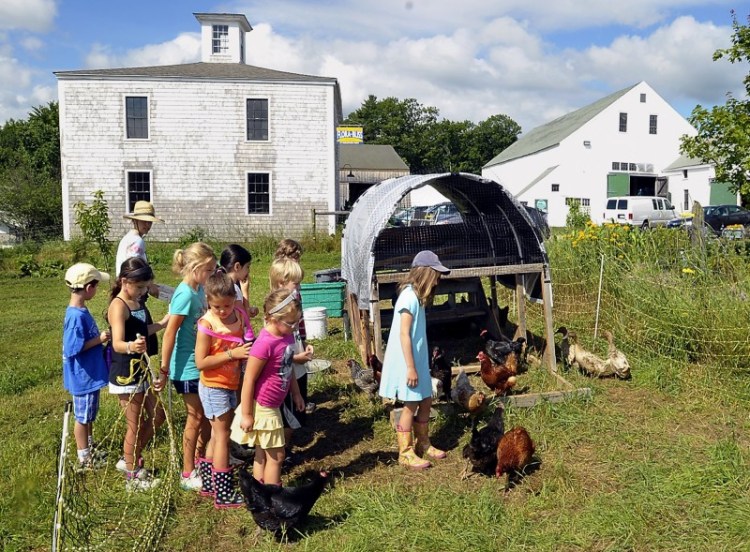Some of Maine’s future farmers and gardeners – not to mention healthy eaters – are being nurtured right here, right now at summer farm camps. Children as young as 4 years old and as old as high-school students can spend time at several farms in southern Maine, tending crops and animals while learning the importance of good food produced locally.
“It is one of the ways the local food movement expands the movement, educating children about where food comes from,” said Stacy Brenner, a manager at Broadturn Farm in Scarborough, which holds farm camps all summer long. “It is something we have to do if we are going to make small farms viable in the future.”
In addition to Broadturn, Wolfe’s Neck Farm in Freeport, Turkey Hill Farm in Cape Elizabeth, Morris Farm in Wiscasset and Hart to Hart Farm in Albion all offer farm camps. All are day camps, although three of the five have older campers spend one overnight during each week of farm camp.
When I met Wolfe’s Neck Farm campers Abby Lennox and Emma Silver, both from Cumberland, and Robyn Kelmly of Yarmouth, all age 7, and William Dunham, 9, who was visiting Maine from Virginia, they all wanted to take me to see the animals. Their favorite activities were tending animals, including cuddling the ducks and bunnies, patting the goats and looking at the baby turkeys, which, while no bigger than a hand in mid-July, will be table size by Thanksgiving.
Kari Jenkins, Wolfe’s Neck camp director, said that while farm activities are a major part of the campers’ day, the children also play games and have a chance to hop on a farm wagon and visit the shore or marsh, where they explore the tide pools or other aspects of life on the Maine coast.
At Turkey Hill Farm, “They play games, do arts and crafts, do farm work such as harvesting food, make food from the gardens, have unstructured play,” according to the farm’s Holly Sheehan.
“They build forts, catch frogs and basic earthy things like that.”
Another goal of farm camp, Dylan Verner of Morris Farm said, is to teach children responsibility.
“We work to teach them how to play safely in an unsafe environment,” he said. “We are on a farm, after all. We have farm tools, and kids are around stuff every day. We have to teach them not to step on the electric fence, for example.”
While the campers do chores as a learning experience, the farms aren’t using them as child labor, of course. “We prepare projects for them in advance, whether it is tending livestock or harvesting,” Brenner of Broadturn Farm said. “We have them set up a farm stand every Friday, so they get an idea of what it’s like to market things.” Any proceeds go to a nonprofit scholarship fund, she said.
Among these five, Wolfe’s Neck is the longest-running farm camp, at about 15 years. Fees vary from camp to camp, with young campers typically attending for half days, for $130 to $205 a week, and older campers paying $200 to $305. Camps run from seven to 10 weeks at the various locations, though most campers go for one or two weeks, the organizers say.
I learned about farm camps when our 7-year-old granddaughter Alana signed up for one in West Greenwich, Rhode Island, near where her other grandparents live. Alana – like the campers I spoke with at Wolfe’s Neck – likes tending the animals best, especially the goats, but she also enjoyed carding wool. “I made a bracelet from the wool,” she told me proudly.
It may or may not prepare her for a career, but I hope tending the garden at farm camp will at least get her to eat more vegetables.
Send questions/comments to the editors.



Comments are no longer available on this story